Introduction
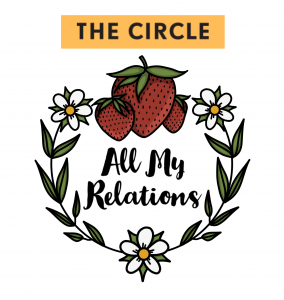 We had the honour of attending the 2021 Along the Seasonal Pathway days (June 15-16th) of The Circle’s All My Relations Gathering (AMR) in June, a powerful event centering Indigenous philanthropic wisdom and imagining sector transformation. This generous offering of the Circle and its partners was a profound experience that called for genuine commitment of heart, mind, soul, and body for three days of what Circle Co-Chairs Tim Fox and Jenn Miller described as an experience of “learning and unlearning.” This experience called on all of us to set aside our fragility, to “show up,” to roll up our sleeves, and to get to work.
We had the honour of attending the 2021 Along the Seasonal Pathway days (June 15-16th) of The Circle’s All My Relations Gathering (AMR) in June, a powerful event centering Indigenous philanthropic wisdom and imagining sector transformation. This generous offering of the Circle and its partners was a profound experience that called for genuine commitment of heart, mind, soul, and body for three days of what Circle Co-Chairs Tim Fox and Jenn Miller described as an experience of “learning and unlearning.” This experience called on all of us to set aside our fragility, to “show up,” to roll up our sleeves, and to get to work.
We’ll do our best to highlight and honour the work that took place at AMR in the few words that follow – including a short review and four key takeaways we gathered from the workshops and plenaries we attended.
Gifts and Offerings along the Seasonal Pathway
In a Twitter thread marking the 13th anniversary of the Circle (2 days before AMR), Kris Archie clearly articulated the organization’s important work: “Whether you are a funder or an Indigenous person looking for $$, we are a place where you can gather, where the stories, the practices and views of Indigenous peoples are paramount, where Settlers are invited to take stock, witness wisdom and get to work…a place where we take our time, take deep breaths, take up space, and where we invite folks to arrive, fill their bellies, rest their hearts, be held and to co-create a future we can all be more proud of.” The AMR Gathering beautifully embraced and reflected this vision.
On June 14th, AMR invited Indigenous participants to the Indigenous Peoples Only Day, titled “Cousin Come Ova Here!” while non-Indigenous participants were invited to a morning workshop on white fragility.
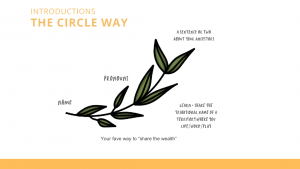
On the 15th and 16th, all participants came together for the “Along the Seasonal Pathway” days of the Gathering. Here we were guided through the four seasons – aligning with the nourishing land-based pathway along which the Circle does its work. A full lineup of incredible speakers and guests shared their wisdom for sector transformation each day, with mornings and afternoons divided among plenary conversations highlighting the season, and concurrent workshops further amplifying each season’s themes.
The morning of the 15th, we walked through Spring: “a time of renewal with the emergence of new trends.” Our hosts and guest speakers focused on the importance of cultural works of renewal, revitalization, land connection work, healing, and youth-led work.
We proceeded to Summer that afternoon, with a focus on building solidarity and good relations, celebration, and presence on the land. It is, as the AMR workbook indicates, about expanding “the notion of what it is to be in Good Relations in this space between Indigenous-led movements, programs and projects and Settler Created Philanthropy.”
We came to Fall the morning of the 16th, the season of shared learning and knowledge mobilization, the season of harvest and preparation. We learned about “the ways that folks are honouring wisdom of seasons previous to share learning, mobilize knowledge, research and activate policy change.” The seasonal conversations centered honouring Indigenous wisdom – by putting learning to action.
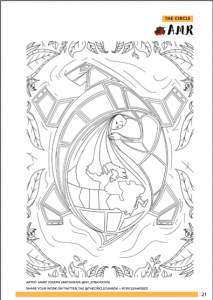 Finally, our last afternoon together we spent in Winter, the season of reciprocity, as our AMR hosts demonstrated. It is a season of embracing and integrating the learnings, unlearnings, and relations activated over the previous seasons.
Finally, our last afternoon together we spent in Winter, the season of reciprocity, as our AMR hosts demonstrated. It is a season of embracing and integrating the learnings, unlearnings, and relations activated over the previous seasons.
Throughout AMR, our hosts maintained a strong focus on well-being, including moments to stretch, breathe, reflect, and even colour (beautiful drawings provided in our Gathering workbooks by Marc Joseph, in addition to morning well-being activities (a JIG FIT! Class led by Madelaine McCallum, yoga led by Vina Brown, and land-based session called Touch the Earth led by Kim Haxton and fun evening activities for connecting at the end of each day. We were graciously welcomed well before the Gathering with care packages filled with gorgeous swag from Indigenous-owned businesses, and were reminded after AMR of the connections we had nurtured, receiving thank you parcels containing gifts from LUSH! Cosmetics, a Circle partner.
More gifts came through the continuous opportunities to connect with one another and build and activate new relations. Whether in small breakout rooms during workshops, Jamboard sessions, or evening activities, these moments of connection were critical to nourishing reflections on how to carry and enact our learnings beyond the Gathering. We reflect on some of these learnings now.
Four Key Takeaways
Honouring Wisdom
The AMR offerings centered and honoured Indigenous wisdoms. As the AMR site indicates: “The primary focus of AMR is to amplify the ways in which Indigenous-led and informed organizations, projects and movements are paving the way forward on key issues for social change and transformation.” Participants were encouraged to make space and show up by humbly listening and then mobilizing learnings in our daily work and action.
In a workshop titled “The Wisdom of Indigenous-led Organizations” Soo-Yinka Erickson Michel, Listening and Learning Coordinator for the Circle, shared about the origin stories, experiences and approaches of seven Indigenous leaders in the nonprofit/philanthropy space, as well as their visions for healing possibilities for the future of the sector. (Register for the Circle’s upcoming Winter Feast, where this important research project will be shared in full!) Dr. Shelley Price’s “Restorying Philanthropy” workshops encouraged participants to consider “enduring uncomfortable spaces in loving contemplation”, imagining how to restory the philanthropic landscape by honouring Indigenous teachings on giving, sharing, hoarding and holding back. We heard much wisdom on generosity, accountability, wealth redistribution and solutions.
Further, we were reminded on our Fall stop along the seasonal pathway that “just because we know something doesn’t mean we’ll act on it,” as Archie explained. It’s key that learning is reciprocal, outward-facing and actionable rather than self-serving and extractive, so honouring wisdom must not stop at listening and learning. The takeaways that follow reflect some of the ways we take action as PhiLab researchers and philanthropic partners.
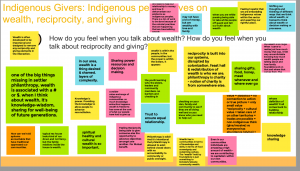
Supporting and amplifying Indigenous-led initiatives
Another central focus of AMR was highlighting and amplifying the work and wisdom of Indigenous movements, givers, leaders, land defenders, communities and organizations. Building on the themes of each season, all plenaries and concurrent workshops spotlighted the excellence of Indigenous-led and -informed initiatives, and encouraged participants to fund, support, and spread the word.
The Indigenous Givers Spotlight sessions focused on specific projects, leaders and organizations, their origin stories, ongoing work and specific asks for support (take note, funding partners!). 4 Spotlight sessions focused on Indigenous-led work on cultural revitalization; artistic expression; research, policy and advocacy; and wealth redistribution [for more info and to support spotlighted groups, have a look at the details for each session of the AMR agenda, listing organizations and leaders! In addition, Workshops led by Indigenous Climate Action highlighted Healing Justice as a framework for climate action and the organization’s important research on decolonizing climate policy. The Yellowhead Institute offered four exciting presentations on their recent Red Papers, Land Back and Cash Back, and participants discussed together the ways philanthropy can enact land back and cash back in their policy, practice and relations.
Acknowledging harm, decentring whiteness, decolonizing practices
AMR shone a light on another important means of activating our learnings: acknowledging how settler-created philanthropy has contributed to and been complicit in ongoing colonial violence. AMR asked us to set aside our fragility and decentre whiteness and settler dominance, with a willingness to listen humbly and a readiness to activate that listening in our daily work and action. Decolonizing practices were therefore at the heart of many of AMR’s offerings.
Workshops led by Ta7talíya Michelle Nahanee, Founder and CEO of Nahanee Creative, and her daughter Ta7talíya Paisley Eva Nahanee, showed how we can promote this decolonization. For Michelle “decolonizing practices are the antidote to colonialism” and require honesty, courage and critical analysis. She developed several award-winning tools to promote the decolonial lens. The first tool is a cultural change framework that includes four practices “cultural protocol”, “cultural fluidity”, “cultural empathy” and “cultural security”. Nahanee Creative also developed an experiential game and territory acknowledgment as additional tools. The experiential game leads people to explore their prejudices and how to change them to build better relationships with Indigenous peoples, while territorial acknowledgment guides sensemaking and connection to lands. Our own journey through these workshops revealed these tools as simple yet powerful means to challenge and change perspective.
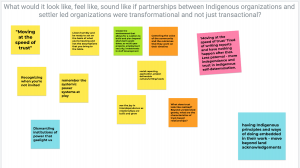
Activism and Investment Strategies
An important move for foundations explored in one workshop is to leverage investment strategies, thinking about mobilizing shareholders as activists. A panel composed of Mark Sevestre from National Aboriginal Trust Officers Association, Shannon Rohan from SHARE, Colette Murphy and Jenn Miller from the Atkinson Foundation discussed the opportunities and challenges related to such a strategy. The panelists note that Canadian settler-created foundations hold several billion in assets and Indigenous foundations also have significant funds. This represents a real power that can be used more directly for social and environmental justice purposes when shareholders with power over the use of invested philanthropic assets are mobilized as activists: “voicing” and “amplifying” concerns about issues and fostering changes. “We are here to change the world” the panelists stated. Sevestre underlines that “the colonial model [of investing] is broken because of the short-termism” and “silence is violence.” Therefore, it is important to do something: “We have to push our executives and board members to move in this direction, which is a challenge.” The panelists pointed out that where there is interest in generating shareholder activism, the next step is building philanthropic organizations’ capacity to support this strategy.
Inner Activist led two “Conscious Use of Power” sessions, helping us deepen our understanding of the realities of power relations. A lack of awareness of our privilege and power can cause conflicts, polarization, and feelings of anger, pain, guilt, helplessness, apathy and despair that impedes our ability to honour wisdom and nurture good relations. We explored the development of our social identities, both marginalized and dominant, as sources of strength and wisdom, and as places of deep wounding.
Conclusions: Gathering to show up, activating our learnings
The pandemic has made it challenging to gather in meaningful ways, especially as we find ourselves connecting virtually so much more often. Yet AMR, hosted entirely online, was remarkably successful in drawing us all together. The intentional focus on hosting and “showing up”, on building and honouring relations, on co-creating the learning process and, most of all, amplifying and honouring Indigenous wisdom truly made this gathering stand out from others, just as the Circle team promised it would.
The learnings, gifts and offerings were abundant and humbling– a clear reflection of the hard work and passion of the Circle, its partners and everyone involved. The Gathering also called on us to take action and mobilize our learnings – rolling up our sleeves and getting to work. To be generous – abundantly funding, supporting and amplifying Indigenous-led solutions and organizations. To make space – humbly stepping out of the way, setting fragility aside, decentring whiteness, and sharing power. Thus, as Archie tweeted, we can all show up to work for a future that we can all be prouder of.
Sabina Trimble (she/her), settler Ph.D. student, Centre for the Study of Philanthropy, University of Kent (UK) & PhiLab’s Western Hub. Mohkinsstsis/Wîchîspa/Guts’ists’i – in Niitsitaapi, Îyârhe Nakoda and Tsuut’ina territories and the homelands of the Métis Nation of Alberta, Region III.
Saouré Kouamé (he/him), Assistant Professor, Telfer School of Management, University of Ottawa, PhiLab Ontario. Unceded Algonquin and Anishinaabek territory.
 We would like to invite everyone to The Circle’s Winter Feast happening this January 25th-27th, 2022.
We would like to invite everyone to The Circle’s Winter Feast happening this January 25th-27th, 2022.
The Circle Feast is an opportunity to celebrate and honour the wisdom that has been gifted through stories that are from our membership and an opportunity to mobilize knowledge. This experience is rooted in cultural teachings related to feasting and we will invite participants to join us in making meals together, being on the land and connecting deeply with one another.

